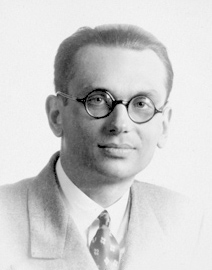
Kurt Friedrich Gödel was a logician, mathematician, and philosopher. Considered along with Aristotle and Gottlob Frege to be one of the most significant logicians in history, Gödel profoundly influenced scientific and philosophical thinking in the 20th century, building on earlier work by Frege, Richard Dedekind, and Georg Cantor.

Martin Gardner was an American popular mathematics and popular science writer with interests also encompassing magic, scientific skepticism, micromagic, philosophy, religion, and literature – especially the writings of Lewis Carroll, L. Frank Baum, and G. K. Chesterton. He was a leading authority on Lewis Carroll; The Annotated Alice, which incorporated the text of Carroll's two Alice books, was his most successful work and sold over a million copies. He had a lifelong interest in magic and illusion and in 1999, MAGIC magazine named him as one of the "100 Most Influential Magicians of the Twentieth Century". He was considered the doyen of American puzzlers. He was a prolific and versatile author, publishing more than 100 books.

Eric Temple Bell was a Scottish-born mathematician and science fiction writer who lived in the United States for most of his life. He published non-fiction using his given name and fiction as John Taine.
Alexander Keewatin Dewdney was a Canadian mathematician, computer scientist, author, filmmaker, and conspiracy theorist. Dewdney was the son of Canadian artist and author Selwyn Dewdney and art therapist Irene Dewdney, and brother of poet Christopher Dewdney.
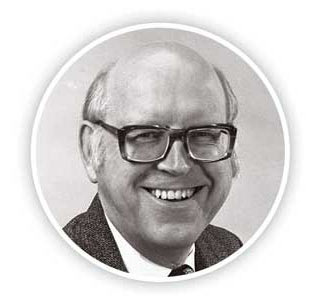
Allen Newell was an American researcher in computer science and cognitive psychology at the RAND Corporation and at Carnegie Mellon University's School of Computer Science, Tepper School of Business, and Department of Psychology. He contributed to the Information Processing Language (1956) and two of the earliest AI programs, the Logic Theorist (1956) and the General Problem Solver (1957). He was awarded the ACM's A.M. Turing Award along with Herbert A. Simon in 1975 for their contributions to artificial intelligence and the psychology of human cognition.
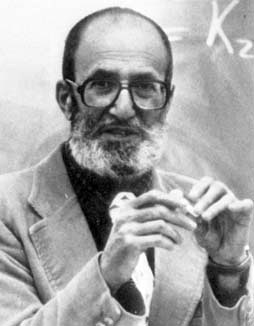
Paul Richard Halmos was a Hungarian-born American mathematician and statistician who made fundamental advances in the areas of mathematical logic, probability theory, statistics, operator theory, ergodic theory, and functional analysis. He was also recognized as a great mathematical expositor. He has been described as one of The Martians.

Ian Nicholas Stewart is a British mathematician and a popular-science and science-fiction writer. He is Emeritus Professor of Mathematics at the University of Warwick, England.
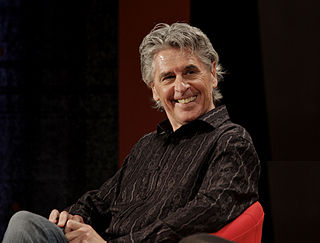
Keith James Devlin is a British mathematician and popular science writer. Since 1987 he has lived in the United States. He has dual British-American citizenship.

Wilfrid Augustine Hodges, FBA is a British mathematician and logician known for his work in model theory.
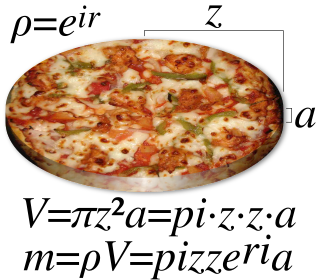
A mathematical joke is a form of humor which relies on aspects of mathematics or a stereotype of mathematicians. The humor may come from a pun, or from a double meaning of a mathematical term, or from a lay person's misunderstanding of a mathematical concept. Mathematician and author John Allen Paulos in his book Mathematics and Humor described several ways that mathematics, generally considered a dry, formal activity, overlaps with humor, a loose, irreverent activity: both are forms of "intellectual play"; both have "logic, pattern, rules, structure"; and both are "economical and explicit".

Robin James Wilson is an English mathematician. He is an emeritus professor in the Department of Mathematics at the Open University, having previously been Head of the Pure Mathematics Department and Dean of the Faculty. He was a stipendiary lecturer at Pembroke College, Oxford and, from 2004 to 2008, Gresham Professor of Geometry at Gresham College, London. On occasion, he teaches at Colorado College in the United States. He is also a long standing fellow of Keble College, Oxford.
The Joint Policy Board for Mathematics (JPBM) consists of the American Mathematical Society, the American Statistical Association, the Mathematical Association of America, and the Society for Industrial and Applied Mathematics.

Innumeracy: Mathematical Illiteracy and its Consequences is a 1988 book by mathematician John Allen Paulos about innumeracy as the mathematical equivalent of illiteracy: incompetence with numbers rather than words. Innumeracy is a problem with many otherwise educated and knowledgeable people. While many people would be ashamed to admit they are illiterate, there is very little shame in admitting innumeracy by saying things like "I'm a people person, not a numbers person", or "I always hated math", but Paulos challenges whether that widespread cultural excusing of innumeracy is truly worthy of acceptability.

Steven Henry Strogatz, born August 13, 1959, is an American mathematician and author, and the Susan and Barton Winokur Distinguished Professor for the Public Understanding of Science and Mathematics at Cornell University. He is known for his work on nonlinear systems, including contributions to the study of synchronization in dynamical systems, and for his research in a variety of areas of applied mathematics, including mathematical biology and complex network theory.

John Colin Stillwell is an Australian mathematician on the faculties of the University of San Francisco and Monash University.

Carlos Castillo-Chavez is a Mexican-American mathematician who was Regents Professor and Joaquín Bustoz Jr. Professor of Mathematical Biology at Arizona State University. Castillo-Chavez was founder and the Executive Director of the Mathematical and Theoretical Biology Institute (MTBI) and the Institute for Strengthening the Understanding of Mathematics and Science. For 2019, Castillo-Chavez was Provost Visiting Professor in the Applied Mathematics Division and Data Science Initiative at Brown University. Castillo-Chavez retired from Arizona State University at the end of spring 2020.
The mathematician Shmuel Aaron Weinberger is an American topologist. He completed a PhD in mathematics in 1982 at New York University under the direction of Sylvain Cappell. Weinberger was, from 1994 to 1996, the Thomas A. Scott Professor of Mathematics at the University of Pennsylvania, and he is currently the Andrew MacLeish Professor of Mathematics and chair of the Mathematics department at the University of Chicago.
Mathematics has no generally accepted definition. Different schools of thought, particularly in philosophy, have put forth radically different definitions. All proposed definitions are controversial in their own ways.

Stevo Todorčević, is a Yugoslavian mathematician specializing in mathematical logic and set theory. He holds a Canada Research Chair in mathematics at the University of Toronto, and a director of research position at the Centre national de la recherche scientifique in Paris.
Barry Arthur Cipra, an American mathematician and freelance writer, regularly contributes to Science magazine and SIAM News, a monthly publication of the Society for Industrial and Applied Mathematics. Along with Dana Mackenzie and Paul Zorn he is the author of several of the volumes in the American Mathematical Society series What's Happening in the Mathematical Sciences, a collection of articles about recent results in pure and applied mathematics oriented towards the undergraduate mathematics major.















